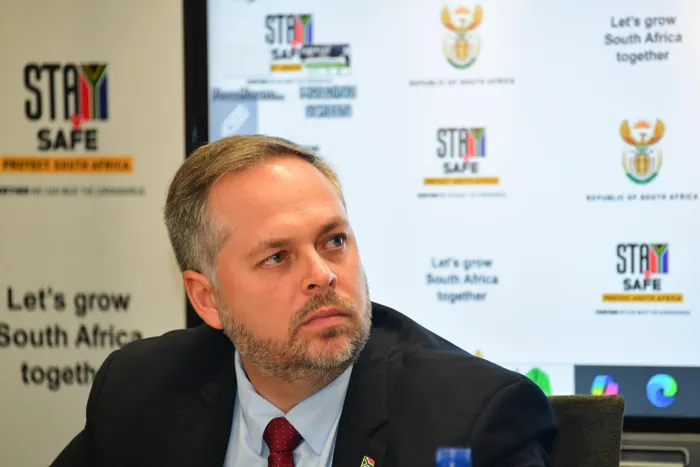More banks to offer smart ID and passport services, says Department of Home Affairs

Home Affairs Minister Leon Schreiber said they will use digital transformation to integrate the Home Affairs IT platform onto banks’ networks, thereby enabling more banks to deliver Smart ID and passport services.
Image: Ntswe Mokoena/GCIS
Home Affairs Minister Leon Schreiber on Tuesday announced that the department will increase the pilot project that currently delivers Smart ID and passport services in about 30 bank branches across the country.
Presenting the R11 billion budget for the department, Schreiber said they would use digital transformation to integrate the Home Affairs IT platform onto banks’ networks, thereby enabling many more bank branches to deliver the service.
“Our target for this financial year is to expand this service to at least 100 more branches,” he said during the budget debate in the National Assembly.
Schreiber also said technology reform will enable South Africans to order Smart IDs and passports through their banking app, similar to when buying electricity or data.
“We will introduce the option of home delivery for Smart IDs and passports, using advanced facial recognition technology to secure the process.”
Schreiber said they will rapidly accelerate access to Smart IDs with the goal of ending the production of new Green ID books by the end of this year.
The minister announced plans to launch new facilities abroad to assist South Africans living and working overseas to have a five-week turnaround time for IDs and passports.
“We are starting in Australia, New Zealand and the United Arab Emirates, followed by France, Germany and The Netherlands later this year, and North America in the new year.”
Schreiber told the MPs that the civics service reforms will lay the foundation for the ambitious plan to create South Africa’s first ever Digital ID system during this financial year.
He said once all citizens and permanent residents have access to Smart IDs, their focus will shift to delivering digital versions of enabling documents that can be accessed online and on smart devices.
“Home Affairs will shortly submit a Digital ID policy to Cabinet for approval to conduct public hearings. Beyond material benefits such as clamping down on fraud and enhancing inclusion, the Digital ID system will also restore the integrity and pride of our cherished South African identity.”
Schreiber further said the Public-Private Partnership project to redesign and redevelop South Africa’s six busiest commercial land ports is progressing well.
“This will enable the Border Management Authority (BMA) to effectively facilitate the movement of people and goods across our ports of entry without any delay, boosting economic growth and regional trade. The approval process is currently with National Treasury and public announcements will follow.”
However, Schreiber noted that despite the positive impact of the deployment of drones and other technology by the BMA, the entity remained critically underfunded.
“I will continue to make the case that it is time for us to all put our money where our mouths are by adequately capacitating the BMA.”
Outlining the budget allocation for the 2025/26 year, Schreiber said the budget will increas by R321 million in 2025/26, R1.2 billion in 2026/27, and R369 million in 2027/28.
“These increases will primarily support the Border Management Authority (BMA) and the preparations for the 2026 local government elections.”
The Independent Electoral Commission has been allocated an additional R885 million in 2026/27 to support the local elections.
ANC MP Mosa Chabane said his party fully supported the budget that was built on the solid foundation of the sixth administration.
“Initiatives that were initiated during the administration, in some cases, limited financial resources prevented the full implementation of the programmes,” Chabane said.
MK Party MP Mariam Muhammad said the department’s budget was not a tool for transformation, but a plaster over a festering wound.
“It does not respond to the real urgent cries of our people. It does not heal the scars left by years of administrative injustice, dysfunctional and systemic exclusion embedded in Department of Home Affairs' failures,” Muhammad said.
DA MP Nicole Bollman said the department’s budget was not without its constraints.
“It reflects meaningful, measurable progress that is helping to grow our economy and create jobs. This is precisely what the Government of National Unity’s apex priority demands, namely rapid, inclusive, and sustainable economic growth through job creation,” Bollman said.
EFF MP Thapelo Mogale said the department’s budget failed to provide sufficient funding needed to ensure it was able to perform its' basic tasks.
“The Department of Home Affairs forms part of the security cluster and is tasked to secure our borders from the influx of illegal immigrants, and secure our identities from fraud and theft. For the past five financial years, the department faced consistent budget cuts, which have hampered its' ability to perform its fundamental task of securing our country,” Mogale said.
mayibongwe.maqhina@inl.co.za
Related Topics: